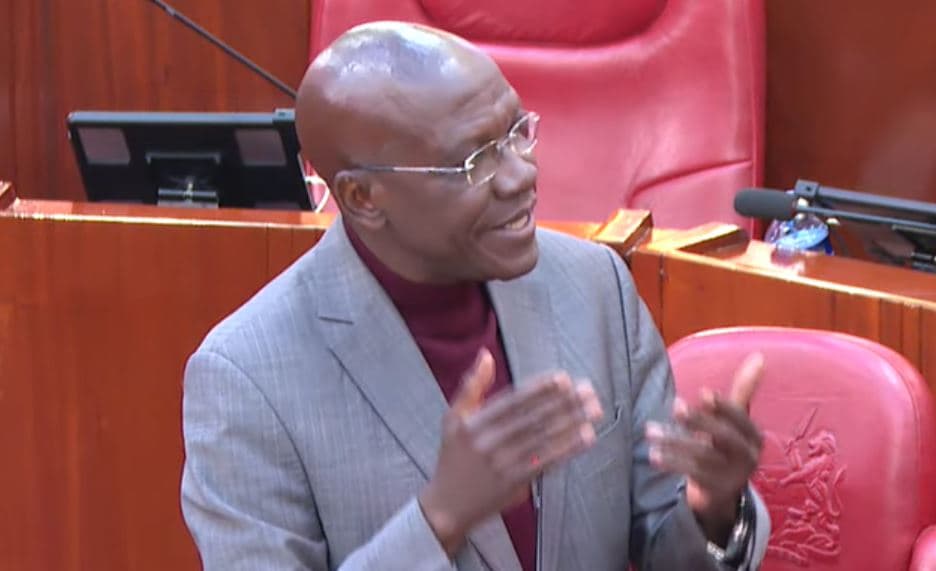We're loading the full news article for you. This includes the article content, images, author information, and related articles.
Kakamega Senator Boni Khalwale was ordered out of the Senate chamber for wearing a turtleneck, igniting a debate on parliamentary decorum and the enforcement of House rules.

NAIROBI, KENYA – The Senate’s afternoon session on Wednesday, 29 October 2025, was momentarily disrupted when Speaker Amason Kingi ejected Kakamega Senator Dr. Boni Khalwale for breaching the House’s strict dress code. The incident has brought renewed focus on the enforcement of parliamentary decorum and the rules governing the appearance of members in the hallowed chambers of Kenya's legislature.
The issue was raised by Migori Senator Eddy Oketch, who drew the Speaker's attention to Dr. Khalwale's attire. Dr. Khalwale, the Senate Majority Whip, was wearing a maroon turtleneck pullover under his suit jacket, a deviation from the prescribed formal wear. Citing the Speaker's rules, Senator Oketch sought clarification on whether the attire was appropriate, noting the cold weather but emphasizing the need for consistent standards. “I am standing under Rule 15 of the Speaker's dress code. I just wanted clarity on whether the Majority Whip is dressed accordingly, so that next time I show up in a turtleneck in this cold, I can be able to do so,” stated Senator Oketch.
In his response, Speaker Kingi first clarified that the relevant guideline was not Rule 15, which pertains to smoking, but rather Speaker's Rule 20, which details the official dress code. He then read the rule, which explicitly requires male senators to be dressed in a coat, collar, tie, long trousers, socks, and shoes, or service uniform, religious attire, or other approved dressings. Finding Dr. Khalwale in violation of this rule, Speaker Kingi ordered him to leave the chamber and return only after changing into the appropriate attire. “Senator Boni, you are in breach of this particular rule, and therefore I will ask you to go dress as per this rule and come back immediately,” Kingi declared firmly. Dr. Khalwale complied with the directive and left the chambers without protest.
This is not the first time Speaker Kingi has had to enforce the Senate's dress code. In a widely reported incident on Wednesday, 24 September 2025, Nominated Senator Karen Nyamu was reprimanded for what was termed “improper dressing.” Senator Nyamu had entered the chamber with her jacket worn on only one shoulder. The matter was raised by Kitui Senator Enoch Wambua, who warned that failing to enforce the rules would set a “dangerous precedent.” Speaker Kingi issued a stern warning to Senator Nyamu at the time, stating that a repeat offense would result in her removal from the chamber.
The consistent application of these rules underscores the Speaker's commitment to maintaining the dignity and seriousness of parliamentary proceedings. The Speaker's Rules (Revised) 2017 are clear on the standards expected of members within the precincts of Parliament, including the chambers, lounges, and dining areas. However, there have been occasions for flexibility. In September 2023, during sittings in Turkana County, Speaker Kingi relaxed the dress code, exempting male senators from wearing ties to accommodate the hot climate, though he still required official shirts. This was framed as a measure to ensure a comfortable working environment for the legislators.
The debate over parliamentary dress codes is a recurring theme in Kenyan politics, often reflecting broader tensions between tradition, modernity, and personal expression. In the National Assembly, former Speaker Moses Wetang'ula in November 2023 banned the popular "Kaunda suits," reinforcing the requirement for a formal suit and tie. This decision aimed to curb emerging fashion trends that were seen as threatening the established decorum of the House.
A more dramatic historical precedent occurred in March 2011, when then-Makadara MP Gideon Mbuvi, popularly known as 'Sonko', was ejected from Parliament by Deputy Speaker Farah Maalim for wearing earrings and sunglasses, which were deemed to not depict the dignity of the House. These instances highlight the long-standing expectation that lawmakers adhere to a conservative and formal standard of dress as a reflection of their public office.
Dr. Khalwale’s ejection serves as a clear reminder to all members of Parliament of the binding nature of the House rules. While some may view dress codes as archaic, the leadership of both houses of Parliament evidently considers them a crucial component of maintaining institutional respect and procedural order. The incident on Wednesday, resolved swiftly and without acrimony, reinforces the Speaker's authority and the established norms of Kenya's legislature.
Keep the conversation in one place—threads here stay linked to the story and in the forums.
Other hot threads
E-sports and Gaming Community in Kenya
Active 8 months ago
The Role of Technology in Modern Agriculture (AgriTech)
Active 8 months ago
Popular Recreational Activities Across Counties
Active 8 months ago
Investing in Youth Sports Development Programs
Active 8 months ago
Key figures and persons of interest featured in this article